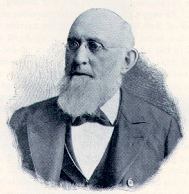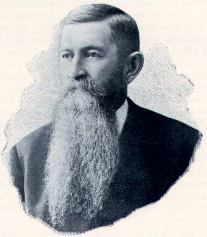engaged in the grain trade for the next thirteen years.
He was married December 25, 1865, to Miss Charlotte A.
Taylor, of La Salle county, Illinois. Mr. Meserve located in
Red Willow county, Nebraska, in October, 1882, and has
resided there ever since. He was in the banking business at
McCook for one year, and afterwards purchased a ranch not
far from that city and went into the open range cattle
business, subsequently devoting his time to ranching and
cattle and hog feeding, for the market. In 1893 he was
defeated for the office of county treasurer of Red Willow
county by the narrow margin of fifty-five votes, and in the
following April was appointed to the office to fill the
vacancy caused by the death of his successful opponent. Mr.
Meserve was nominated the same fall for the office, and was
elected, and was re-elected for a second term. In 1896 he
received the nomination for state treasurer at the people's
party convention held at Hastings, was accorded the loyal
and hearty support of the friends of fusion, regardless of
party, and was elected by 11,175 plurality. He took the oath
of office January 7, 1897. Treasurer Meserve is a gentleman
of high standing in the commercial community, and enters
upon the arduous and difficult duties of his office with the
confidence of his fellow citizens, with high hopes of a
successful and proper administration of the important office
with which he has been honored. Both his private and public
records as a business man are such as to warrant the
expectation that he will deal with the public matters and
funds with which he is charged, in the most conscientious
manner. |
COMMISSIONER OF PUBLIC LANDS AND BUILDINGS.

movement in Nebraska. He is a, native of Indiana, and was
born at Merom, Sullivan county, October 7, 1833. From his
ninth to his seventeenth year young Jacob worked on his
father's farm and attended school part of the year. He
entered the State University at Bloomington, Indiana, and
graduated from that institution in 1857 with honors. Before
leaving the stage where he |
had delivered his commencement oration he was engaged to
teach in that popular educational institution, Glendale
Female College, in Ohio. He married one of the teachers in
this college, Miss Ellen Batterton, of Bloomington, Indiana,
one of his classmates. The young professor was elected
president of the Majors Female College at Bloomington,
Illinois, and after serving one year resigned to accept the
principalship of the public schools at Gosport, Indiana,
where he served three years. In 1862, while engaged in
teaching, a vacancy occurred in the legislative ticket and
Mr. Wolfe was selected to fill the vacancy, was elected,
served one term in the Hoosier legislature, and declined a
second. In 1865 he was elected county treasurer by a
handsome majority, and at the end of his term was
re-elected. While teaching, and before entering the
legislature, he pursued the study of law, and for some time
attended a law school. He was excused from the legislature
to permit him to pass his examination, and graduated from
the law department of his college and received the
Bachelor's degree. In the legislature he assisted in
electing Hon. David Turpie and Thomas A. Hendricks to the
United States senate. In 1871 he came to Nebraska on a
recreation excursion, became infatuated with Lincoln and
vicinity, purchased his present farm, where he has resided
ever since. As a student of political economy and a close
observer of public affairs, Mr. Wolfe inevitably became
interested in state politics. He was nominated in 1890 at
the first convention of the independent people's party for
state treasurer, made a plain business-like canvass, ran
ahead of his ticket, and received a majority of over 9,000
votes outside of Douglas |

|
 |
 |
 |
© 1999, 2000, 2001 for NEGenWeb Project by Geil Wiggins, Ted & Carole Miller
